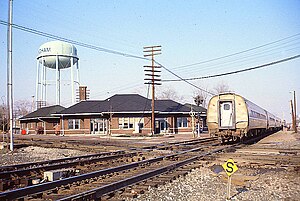
The National Railroad Passenger Corporation, doing business as Amtrak, is the national passenger railroad company of the United States. It operates inter-city rail service in 46 of the 48 contiguous U.S. states and three Canadian provinces. Amtrak is a portmanteau of the words America and track.

The City of New Orleans is a long-distance passenger train operated by Amtrak in the Central United States between Chicago and New Orleans. The overnight train takes about 191⁄2 hours to complete its 934-mile (1,503 km) route, making major stops in Champaign–Urbana, Carbondale, Memphis, and Jackson as well as in other small towns.

The Southwest Chief is a long-distance passenger train operated by Amtrak on a 2,265-mile (3,645 km) route between Chicago and Los Angeles through the Midwest and Southwest via Kansas City, Albuquerque, and Flagstaff mostly on the BNSF's Southern Transcon, but branches off between Albuquerque and Kansas City via the Topeka, La Junta, Raton, and Glorieta Subdivision. Amtrak bills the route as one of its most scenic, with views of the Painted Desert and the Red Cliffs of Sedona, as well as the plains of Illinois, Missouri, Kansas, and Colorado.

The Cardinal is a long-distance passenger train operated by Amtrak between New York Penn Station and Chicago Union Station via Philadelphia, Washington, D.C., Charlottesville, Charleston, Huntington, Cincinnati, and Indianapolis. Along with the Capitol Limited and Lake Shore Limited, it is one of three trains linking the Northeast and Chicago. Its 1,146-mile (1,844 km) trip between New York and Chicago takes 281⁄4 hours.

The Sunset Limited is a long-distance passenger train run by Amtrak, operating on a 1,995-mile (3,211 km) route between New Orleans and Los Angeles. Major stops include Houston, San Antonio and El Paso in Texas, as well as Tucson, Arizona. Opening in 1894 through the Southern Pacific Railroad, Sunset Limited is the oldest continuously operating named train in the United States.

The Lincoln Service is a 284-mile (457 km) higher-speed rail service operated by Amtrak that runs between Chicago, Illinois and St. Louis, Missouri. The train is a part of the Illinois Service and is partially funded by the Illinois Department of Transportation. The train uses the same route as the long-distance Texas Eagle, which continues to San Antonio and Los Angeles. A connection with the Kansas City-bound Missouri River Runner is available in St. Louis.

The Chicago Hub Network is a collection of proposed fast conventional and high-speed rail lines in the Midwestern United States including 3,000 miles (5,000 km) of track. Since the 1990s, there have been multiple proposals to build a network from Chicago to destinations such as Milwaukee, Madison, Minneapolis, Indianapolis, Detroit, Kansas City, St. Louis, Cleveland, Cincinnati, and Louisville. In addition, the rail lines from the Chicago hub would connect through to cities in Canada. Eastern routes from Chicago would also blend into the Ohio Hub network. In addition to providing better connections between Midwestern cities, the projects are intended to reduce or eliminate the operating subsidies that American passenger train routes currently require.

The North Coast Hiawatha was a long-distance passenger train operated by Amtrak between Chicago, Illinois, and Seattle, Washington.

The Desert Wind was an Amtrak long-distance passenger train that ran from 1979 to 1997. It operated from Chicago to Los Angeles as a section of the California Zephyr, serving Los Angeles via Salt Lake City; Ogden, Utah; and Las Vegas.

The Kansas City Mule and St. Louis Mule were a pair of 283-mile (455 km) passenger trains operated by Amtrak running between St. Louis and Kansas City, Missouri as part of the Missouri Service train network. Also operating over this route was the Ann Rutledge, which originated in Chicago. In January 2009, Amtrak consolidated these trains under the name Missouri River Runner.

The Pioneer was an Amtrak long-distance passenger train that ran between Seattle and Chicago via Portland, Boise, Salt Lake City, and Denver. Operating from 1977 to 1997, the Pioneer was the last passenger rail route to serve Wyoming, Southern Idaho, or Eastern Oregon.

The Floridian was a train operated by Amtrak from 1971 to 1979 that ran between Chicago and Florida, with two branches south of Jacksonville terminating at Miami and St. Petersburg. For its Nashville to Montgomery segment, its route followed that of several former Louisville & Nashville Railroad (L&N) passenger trains, including the Pan-American and the Humming Bird. Originating in Chicago, the train served Lafayette and Bloomington, Indiana; Louisville and Bowling Green, Kentucky; Nashville, Tennessee; Decatur, Birmingham, Montgomery and Dothan, Alabama; and Thomasville, Valdosta and Waycross, Georgia.

The Lone Star was an Amtrak passenger train that ran between Chicago and Houston, or Dallas via Kansas City, Wichita, Oklahoma City, and Fort Worth. The train was renamed from the Texas Chief, which the Atchison, Topeka and Santa Fe Railway had introduced in 1948. Amtrak discontinued the Lone Star in 1979.

The National Limited was the premier train of the Baltimore and Ohio Railroad (B&O) on its route between Jersey City, New Jersey, and St. Louis, Missouri, with major station stops in Washington, D.C., and Cincinnati, Ohio. It operated from 1925 to 1971. For much of its life it offered exclusive all-Pullman service, and it was the first long-distance train to be entirely air-conditioned. The National Limited was one of many trains discontinued when Amtrak began operations on May 1, 1971. Amtrak revived the name for another New York–St. Louis service which did not use the B&O route.
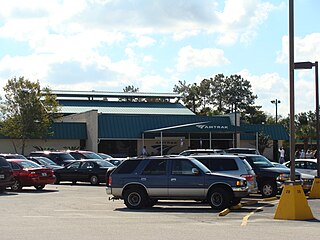
Jacksonville station is an Amtrak train station in Jacksonville, Florida, United States. It serves the Silver Meteor and Silver Star trains as well as Amtrak Thruway buses to Lakeland. The station is located at 3570 Clifford Ln, Jacksonville, FL.
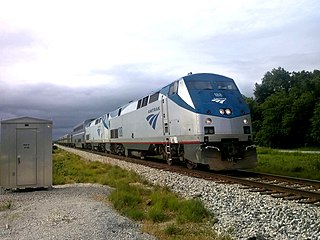
The Hoosier State was a 196-mile (315 km) passenger train service operated by Amtrak between Chicago and Indianapolis. It ran on the four days each week that the Cardinal did not run, giving daily rail service to the Chicago–Indianapolis corridor.

The Missouri River Runner is a 283-mile (455 km) passenger train service operated by Amtrak in Missouri between Gateway Transportation Center in St. Louis and Union Station in Kansas City. The eastern half of the route runs largely along the right bank of the Missouri River.
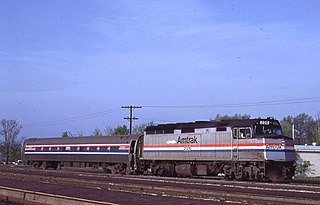
The River Cities was a passenger train operated by Amtrak from 1984 to 1993 between Kansas City, Missouri, and New Orleans, Louisiana, via St. Louis, Missouri. It operated as a section of the City of New Orleans and the Mules.
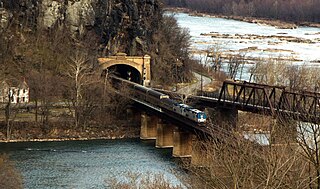
The Long Distance Service Line is the division of Amtrak responsible for operating all intercity passenger train services in the United States longer than 750 miles (1,210 km). There are fifteen such routes as of 2023, serving over 300 stations in 39 states.
The Corridor Identification and Development Program, abbreviated as the Corridor ID Program, is a comprehensive planning program for inter-city passenger rail projects in the United States administered by the Federal Railroad Administration (FRA) under the 2021 Infrastructure Investment and Jobs Act (IIJA). Each route accepted into the program is granted $500,000 toward planning activities and is prioritized for future federal funding.
